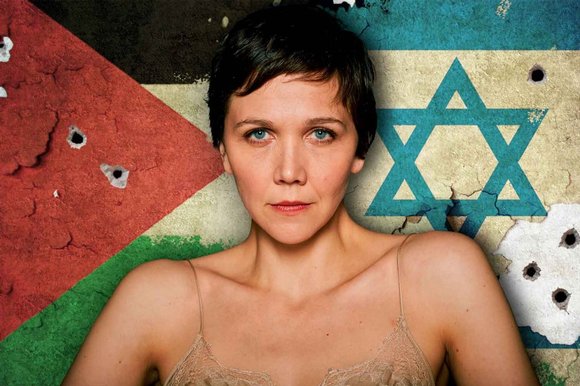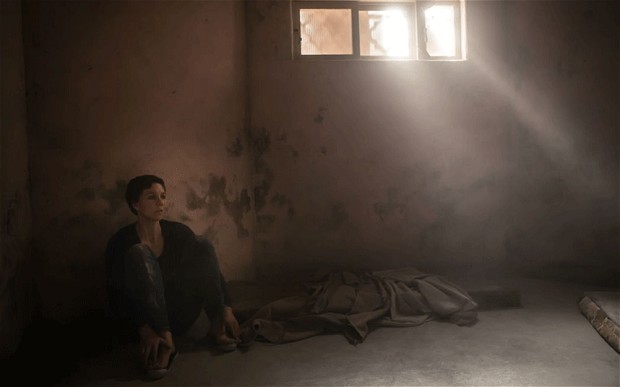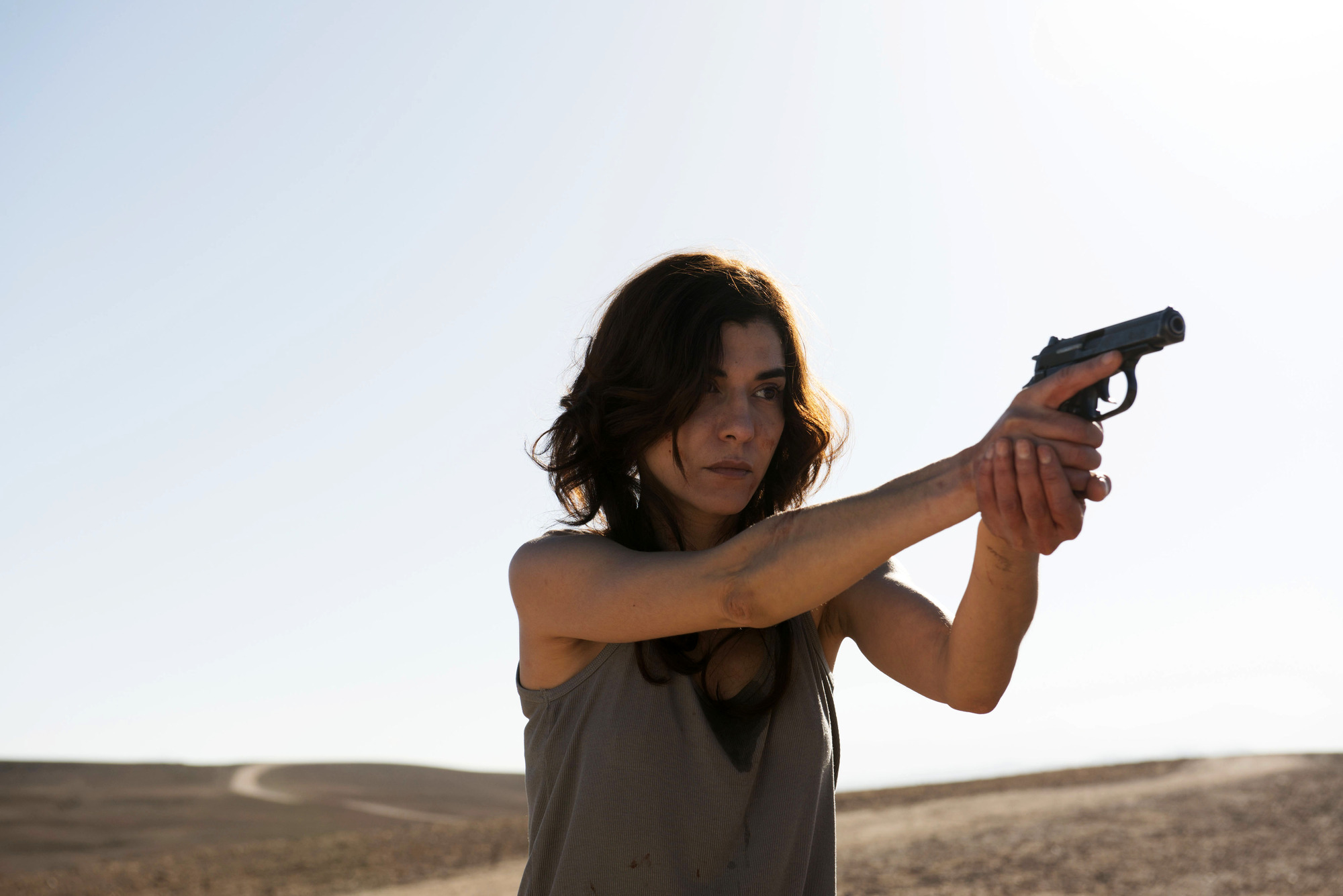Let me attempt to describe the experience of watching the BBC’s widely acclaimed 8 part mini-series, The Honourable Woman. Imagine walking into a five star restaurant and being ushered to your seat by a beaming maitre d’ with a cultivated English accent. The immaculate dinner service is laid out on a pristine white tablet cloth and the wine is served to you in fine crystal goblets. The initial tasting seems quite promising. Then you take a full mouthful of the fine red wine and it leaves you with the distinct impression of pure unadulterated piss. The only thing that could have possibly made this experience more memorable is if a cockroach had crawled down your throat as you swished the wine around in your mouth. Was this a mistake? Did you do something to offend the gods or the owners of the restaurant? Did you deserve it? (maybe) Or is this all they’re capable of—excellent table settings in the service of excrement.
The Honourable Woman is the brain child of Hugo Blick who was also responsible for the somewhat overrated crime drama, The Shadow Line. It stars Maggie Gyllenhaal as a Jewish heiress named Nessa Stein who witnesses the brutal assassination of her father as a child. He is ostensibly killed by radical Palestinians in revenge for selling arms to Israel. Now fully grown and the CEO of her father’s company, she is in the final phases of a plan to lay a fiber optic cable network throughout the West Bank. But that enterprise only forms one part of her larger project of altruism and reconciliation. Her educational foundation (run by her brother) also funds a series of universities throughout Israel with a mind to providing equal access to higher education for both Arabs and Jews.
Yet her righteousness and sense of ethical obligation is of an even high order then is shown by these acts. As is revealed in later episodes (but well telegraphed to viewers from at least the second episode), she was kidnapped and raped during a visit to Gaza some 8 years back, and forced to have the child of her Palestinian rapist.
For some inexplicable reason, a number of reviewers have highlighted Nessa’s sense of agency and ability to outwit the various machinations of the organizations which circle her (MI6, the CIA, the Israelis, and various shadowy Palestinian organizations). Nothing of the sort occurs in The Honourable Woman.
Nessa is persistently caught on the back foot and is almost always at the mercy of her tormentors. This is by no means a subset of the “realism” which Blick presumes to have foisted on his audience, for Nessa is entirely positioned as a self-sacrificing martyr. She is twice kidnapped, twice raped, physically abused on several occasions, betrayed at every point, constantly threatened with murder, and so thoroughly psychologically tormented that she sleeps in a safe room every night. She faces all of this with the equanimity of a modern day saint; all cropped hair and rays of light shining down on her stained, anguished face like the light of God.
In her sexual torment, she joins a select group of female saints, for there are precious few of these who are recorded as having been raped (though no doubt many were). It is no coincidence then that Gyllenhaal frequently appears to be channeling Falconetti in Dreyer’s The Passion of Joan of Arc, one of the few saints to have been thus abused. In the penultimate episode of Blick’s concoction, Nessa even wears a white pant suit to a groundbreaking ceremony in Hebron just as was Joan’s wont. She is very nearly offered up to the flames when a bomb goes off at the same ceremony, the shrapnel tearing into her back leaving the marks of a flagellant.
Nessa initially resists her rape at the hands of her Palestinian kidnappers but then quietly lies down and accepts her fate when she sees her friend being assaulted. Years after this, she is date raped while in a depression fueled alcoholic haze. This she seems to accept, at least at first, with a drunken pragmatism. The MI6 minder/friend who ensures her swift medical care even asks her if she has been engaging in high risk behavior over the years. When questioned by the Palestinian leader behind her rape (and her brother and father’s deaths) as to her lack of desire for revenge (as is his own desire), she babbles through tears that she has often asked herself this question following her innumerous scourgings, and has concluded that she “deserve[s] it.” It certainly helps that said evil Palestinian mastermind resembles nothing less than a James Bond villain with an intravenous line substituting for a white Persian cat and wobbly optics.
I’ve seen some talk concerning this drama’s subtlety and convoluted plotting. The first point, at least, can be quickly dispensed with. If the foregoing description hasn’t already made this clear, Blick’s ideas are wielded like cudgels. For instance, we understand that Nessa has daddy issues because her father scrutinizes her from the heights of a family video projected on her study walls even as she fucks a MI6 mole (presumably a subset of her high risk sexual behavior).
Any talk of complex plotting certainly demands a lengthy harangue if not frequent slaps with a large wet fish. If there is one reason why the central conspiracy would never occur to the average viewer, it would be because it resides in that fantasy land lying between ignorance and pure imbecility.
The plot deserves to be spoilt quite thoroughly. In short, in the final episode, the United States is revealed to be working in concert with the Palestinians (I don’t know who; maybe Fatah and various other rogue groups) to create a climate receptive to Palestinian Statehood right under the noses of the Israelis. Following the bombing in Hebron, the U.S., who masterminded this false flag operation with the Palestinians, will no longer veto any U.N. applications with regards the recognition of the Palestinian state.
Yes, you heard that right—the writers of The Honourable Woman have the U.S. (or at least its Secretary of State) working with the Palestinians to thwart Israel in a false flag operation. This would be the same United States which opposed Palestine’s full membership in UNESCO in the face of overwhelming support (107-14) in 2011; the same United States which cast the single “No” vote in July 2014 on the issue of investigating war crimes committed in Gaza; the same United States which voted overwhelmingly to send more funding to Israel for the Iron Dome missile defense system and to allow Israel to raid its arms stockpiles to rain more misery on the Palestinians.
To add even more salt to the wound, one of the closing scenes has a news report stating that China and Russia might veto said U.S. plans not to oppose Palestinian statehood. Let me see, this would be the same China and Russia which have voted “yes” to Palestinian recognition, “for” UNESCO membership and “for” non-member observer state status. Care to guess how the U.S. voted on all these issues? These two nations also voted decisively to support the investigation into war crimes in Gaza in 2014. But do we really have any right to be surprised at this in a delusionary world where rape is martyrdom, and a device to give depth and agency to women? The asinine logic on display here derives from the same place as those who feel that Schindler’s List was about Nazis saving the world from Jews.
Zionist commentators are of course horrified at the abuse meted out at Israel in The Honourable Woman. But let us count the ways in which the state of Israel has been denigrated. Firstly, Jews are portrayed as arms merchants which is certainly an injustice since Israel doesn’t traffic in arms. The Israelis (Shin Bet? Mossad?) are also shown tapping into Palestinian cell phone traffic through Nessa Stein’s fiber optic cable which is of course absolutely disgusting and unthinkable! The Israeli representative in London also admits to plans to capture and interrogate a Palestinian businessman who is making deals with the U.S. Secretary of State, but guess what? They’re so ineffectual that they’re beaten to the punch by the nefarious U.S.-Palestinian cabals running amok throughout London. The latter elite agents fake the suicide of one of their own in order to silence him. These same Palestinians have the ear of politicians and secret agents throughout the English speaking world, which must explain why U.S. and U.K. have been such “fine” supporters of their cause through the years.
The Palestinians have it much easier. They’re portrayed as drug addled rapists, general haters of women, mass murderers of their own countrymen, criminal masterminds consumed by vengeance, and as generally confused with regards to morals. Nice Palestinians? I don’t think they exist in the world of The Honourable Woman. The only good Palestinian in Blick’s masterwork of blockheadness is a dead Palestinian or at least a silent one. Even the Arab-Muslim hating worlds of Homeland and 24 didn’t hit rock bottom quite so hard. The BBC is often said to have a balance issue with regards Palestine, but on the basis of the dramas which they have commissioned, I think we can safely say which side of the scale they have their thumbs on.
There is a more charitable way to read Blick’s drama, and that is to see in it a call for reconciliation and a (wishful) metaphor for Israeli-Palestinian relations. This is most clearly seen in the narrative path taken by Nessa’s Palestinian confidant, Atika. Atika turns out to be a vengeful subversive lying in wait to do harm to Nessa and her family. Among other things, she leads Nessa’s brother to his doom in the penultimate episode of the series. Yet her demands for violent compensation stop short of Nessa’s rape (which she tries to stop) and she is the only person with sufficient compassion to care for the product of that assault. In the final act, she is killed while saving Nessa and her kidnapped child from some fellow conspirators less enlightened (presumably) than herself.
If viewed from a biblical standpoint, both Nessa and Atika can be seen as scapegoats with the former “offering” sent into the wilderness (for Azazel, see Leviticus 16:8) and the latter given as a blood sacrifice to God. This explains Nessa’s constant position of suffering in this farce as well as her sense of culpability; they are acts of contrition on behalf of the nation of Israel. Yet the twisted nature of the characterizations and political drama overwhelm any such noble intentions. Any fixation on this line of reasoning will inevitably lead the viewer to wonder why the only “saint” allowed for in The Honourable Woman is a Jewish one.
The Honourable Woman is certainly sufficient cause for the donning of sackcloth in shameful repentance, and no doubt obscene enough to earn a host of Emmy and BAFTA nominations come award season. It is an embarrassment for all involved whatever their declared political leanings—a beautifully composed addition to the annals of degenerate propaganda.




Sounds like a good one.
Oh wow, so it actually got far worse than I ever expected it to. Glad I dropped this shit after episode 3. Stephen area is fantastic, but considering he plays more or less the exact same character as his role in Utopia, you’re better of just watching that.
The final episode is certainly one of the worst things I’ve seen this year. Probably marginally more excusable if it was a Batman comic or something.
Yeah, it’s a very similar performance by Rea in both. I don’t remember the hangdog thing being such a big thing with his earlier performances. Utopia sort of goes off the rails in Season 2 though.
This is by far the best and most accurate review of The Honerable Woman I’e read. The whole thing suffers from some truly dreadful acting, stilted dialouge and complete lack of credibility. The Shadow Line was even worse.
Hugo Blix’s output reminds me of Stephen Pollicof’s pretentious dull Hampsted drama’s with added guns.